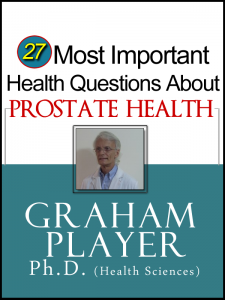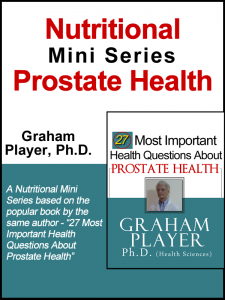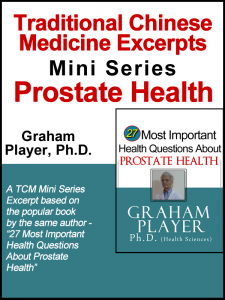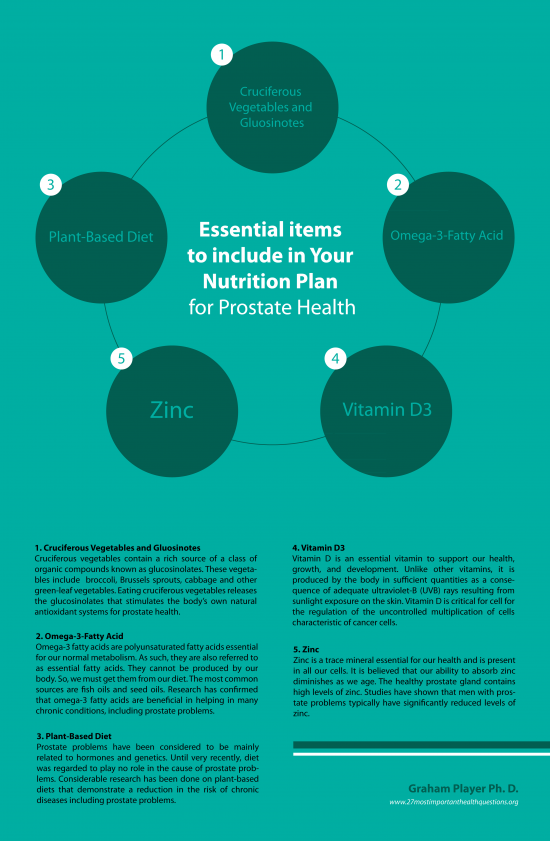Prostate Health
My books on Prostate Health are now available on Amazon.
For up to date information on all my books please refer to my Amazon Author Page, where you can simply click on the relevant book to purchase from Amazon.
“Answers to 27 most commonly asked questions about prostate health”
How to prevent prostate cancer, maintain a healthy prostate gland, and live a long life.
The Main book ’27 Most Important Health Questions About Prostate Health’ is offered in two formats, e-book and paperback. There are an additional two ‘Mini Series’ books available as e-books.
Here is a list of the Prostate Health books:
- The Main book in paperback format – ’27 Most Important Health Questions About Prostate Health’
- The Main book in e-book format – ’27 Most Important Health Questions About Prostate Health’
- Mini Series e-book – ‘Nutritional Mini Series Prostate Health’
- Mini Series e-book – ‘Traditional Chinese Medicine Excerpts Mini Series Prostate Health
The contents in the two mini series e-books are also reflected in the Main e-book and the Main paperback.
The paperback book has the same content as the Main e-book.
Some Reader’s Comments
“ Quite impressed. It’s authoritative without being preachy; comprehensive but easy to read” … Dr.Angel Gomez M.D.
“Just what you need. The book takes you through the normal functions of the organ to various dysfunctions and ends with the healing of the problems. On top of that it gives you some ideas of alternative treatments in a clear and understandable way”…Conny Dolonius
“Graham Player’s book is ideal for the lay man. Easy to understand with helpful information to enable you to make your next decision on prostate health”…Don Felbaum.
After seeing the effects of prostate cancer on his father first hand, Graham Player (Ph.D. in Health Sciences) — a medical researcher for more than 30-years, nutrition specialist, Chinese medicine practitioner, health consultant, and author of health books — conducted extensive research on prostate cancer through health researchers, professional journals and research studies.
Player used a common-sense approach to writing his latest e-book series, “27 Most Important Health Questions,” based on his comprehensive survey of what people want to know about various health topics. As part of his research, he compiled a list of 1000 questions that people wanted answers to. From those, he chose the 27 most important questions that most people wanted to be answered in a quick, objective, and factual way.
Player has a strong regard for both Western and traditional Eastern systems of medicine. He emphasizes, however, that Western medicine focuses mainly on symptomatic therapy and can be limited in diagnosing and treating chronic illnesses at its outset. Traditional Chinese medicine, on the other hand, focuses on dealing with the root causes of diseases, such as prostate cancer, and treating them in their early stages. According to Player, many diseases that Western medicine fails to treat can be cured by Chinese healing systems.
The information you will find in this 100+ page guide book covers natural remedies and nutrients, nutritional guidelines, mainstream medical information, innovative medical diagnostic and therapeutic procedures, and the traditional Chinese medicine approach to prostate management, which you or your doctor may not easily have access to.
In Chapters 3-9 get
- Answers to 27 Most Important Health Questions on Prostate Health – see excerpts below
In Chapter 10 discover
- readily available food items and nutrients that are crucial for prostate health management
- how combing these food items and nutrients works synergistically to ensure prostate health
- effective natural supplements for cancer treatment without side effects or surgery
- items that are detrimental to prostate health
In Chapter 11 learn
- 3 new surgical procedures that can treat prostate cancer with few side effects
- 1 prescription drug that is very effective in prostate cancer treatment
- 1 safe diagnostic procedure that increases the accuracy of prostate cancer detection
In Chapter 12 explore
- how Chinese medicine treats prostate problems using natural methods
- the Chinese Dietary Therapy approach developed over 4,000 years
- 7 ancient Chinese herbs that can positively affect your prostate health and which you can buy today
In the Appendices 1 and 2 find
- 25 pages of the best science based health research for the nutrients mentioned in Chapter 10 and 12
The following excerpt is copyrighted© and reprinted by permission. All rights reserved.
Summary of 27 Questions
- What is the purpose and function of the prostate gland?
The purpose of the prostate is to produce prostatic fluid mixed with sperm from the testicles, secretions from Cowper’s glands, and secretions from the seminal vesicles to make the semen that is released during ejaculation.
- What are the causes of prostate problems?
The causes of prostate problems can be genetic, environmental, or hormonal. It can also be due to one’s lifestyle and age, inflammation, or unknown factors.
- Is it true that prolonged sexual abstinence is not healthy for the prostate gland?
Prolonged sexual abstinence may not be healthy for the prostate gland. A study in the British Journal of Urology International shows that 20-year-old men can reduce their chances of developing prostate cancer by ejaculating more than five times each week.
- How can I maintain a healthy prostate gland?
A healthy prostate gland can be maintained by eating a balanced diet, taking nutritional supplements, exercising regularly, practicing safe sex, and not smoking cigarettes or drinking alcohol.
- What foods or natural herbs are known for supporting the prostate gland?
Foods that are known to support the prostate are those that contain high amounts of zinc, vitamin A, and omega-3 fatty acids.
- Are there any particular vitamin or mineral supplements that are known to support the prostate gland?
Vitamins, minerals, and supplements that are known to support the prostate gland include vitamin A, zinc, and omega-3 fatty acids.
- At what age and at what frequency should I have prostate examinations or tests?
Men who have a very high risk of developing prostate cancer, such as those with multiple close relatives who have developed prostate cancer, should begin having prostate examinations and tests at the age of 40 years. The frequency of their subsequent examinations and tests depend on the PSA level.
- What are the symptoms of prostate problems or prostate cancer?
As the prostate enlarges, it causes lower urinary tract symptoms because it surrounds the urethra that carries urine out of the body. The symptoms of an enlarged prostate or benign prostatic hyperplasia include urgency, frequency, hesitancy, straining, weak urine stream, dribbling, sensation of incomplete emptying of the bladder, urinary retention, and urinary incontinence.
Symptoms of advanced prostate cancer include weight loss, fatigue, swollen nodes, bladder distension, edema, and bone pains.
- What tests are typically done for the prostate gland, and is there any test I can do myself?
Tests done for the prostate gland include digital rectal examinations, prostate specific antigen (PSA) tests, urinalysis, prostate ultrasounds, prostate biopsies, urinalysis, MRI, CT scan, and bone scans.
Men can also examine their own prostates the way women examine their breasts to check for abnormal swellings. They can do this by inserting a finger into their rectum and feeling the prostate for firmness (the prostate should be firm and not hard like a knuckle).
- Why and to what extent does the prostate gland become enlarged, and what is its normal healthy size?
A normal, healthy prostate is around the size of a small plum or walnut and has a volume of around 20 grams in a 20-year-old man. Conditions such as prostatic cancer and benign prostatic hyperplasia can cause the prostate to enlarge.
- Is the PSA blood test an accurate measure of the presence or absence of prostate problems, and should I have PSA tests repeated for increased accuracy?
A PSA blood test is not an accurate measure of the presence or absence of prostate problems. Some prostate problems can coexist with a normal PSA level.
Repeated or serial PSA tests are usually done to evaluate for prostate cancer progression, to assess a patient’s response to treatment, and to monitor for recurrences rather than to increase accuracy.
- Does a higher than normal PSA test result mean that prostate cancer may be present or may develop over time?
Though many prostate cancer patients have higher than normal PSA test results, a higher than normal PSA does not necessarily mean that prostate cancer is present or that it may develop over time.
Patients with benign prostatic hyperplasia and prostatitis can have PSA levels that are higher than normal, and these conditions are not risk factors for developing prostate cancer.
- Is a digital rectal examination of the prostate sufficiently accurate and conclusive, particularly in terms of false positives and false negatives?
A digital rectal examination is not sufficiently accurate and conclusive in determining the presence or absence of prostate diseases and especially the potentially fatal prostate cancer because it can yield both false positive and false negative results.
- If an ultrasound shows a shadow on the prostate gland, does it mean that cancer is present?
A shadow seen on the prostate gland when a transrectal ultrasound of the prostate is done does not necessarily mean that cancer is present. The shadowy areas can be caused not only by prostate cancer, but also by prostatic atrophy, prostatic infarction, and conditions that cause granulomatous prostatitis.
- When is a biopsy of the prostate gland necessary, and what will it reveal?
A biopsy of the prostate gland is necessary when a person is found to have abnormal digital rectal examination findings or above normal PSA levels. The pathologist examines the tissue for cancer cells and then assesses the architecture or patterns of the glands in the prostate.
These patterns help determine the Gleason score, which is a universally accepted grading system of prostate cancers.
- What are the conditions that determine if removal of the prostate is necessary?
Factors that determine if removal of the prostate is necessary can be divided into benign prostatic hyperplasia, prostatectomy, and prostate cancer prostatectomy indications.
- What statistics are available about the subject of prostate gland problems which indicate frequency, test accuracy, treatment outcomes, survival rates, etc?
Benign prostatic hyperplasia affects approximately 30% of men older than 50 years and 90% of men over 85 years. The treatment outcomes for prostate cancer depend on the stage of the tumor when the patient received treatment and the type of treatment they received.
The disease-free 10-year survival rates for men with prostate cancer vary depending on the Gleason grade and the PSA level.
- Can an enlarged prostate gland affect fertility and sexual enjoyment?
An enlarged prostate can contribute to sexual problems due to the physical enlargement itself and due to its treatment. Erectile dysfunction can develop as a result of prostate cancer or as a complication of its treatment.
Up to 50% of men develop erectile dysfunction after treatment with surgical interventions, radiation therapy, and hormonal therapy.
- Does excessive sexual activity, stimulation, or massage of the prostate, affect the prostate gland?
Studies show that men in their twenties who ejaculate either by intercourse or by masturbation more than five times each week suffer less from prostatic hypertrophy, prostate cancer, and prostatitis. Prostate massage is used to stimulate the flow of seminal fluid.
Therefore, when done during intercourse or masturbation, it can affect the prostate gland.
- What are the health or lifestyle risks if the prostate gland becomes enlarged, and is it acceptable to leave it untreated using a wait-and-see approach?
Several health risks may arise if benign prostatic hyperplasia is left untreated.
If the prostate gland is enlarged because of cancer, in some cases, it is acceptable to adopt a wait-and-see approach because most prostate cancers are slow-growing tumors that may never impact a patient’s life adversely, while their treatment may result in impotence and other complications that may significantly lower his quality of life.
- What is the likelihood that prostate cancer may spread to other areas of the body?
Prostate cancers can spread to other parts of the body in three ways: direct extension to other organs in the pelvis such as the ejaculatory ducts and seminal vesicles, through the bloodstream to distant organs such as bones and the liver, and through the lymphatic system to other parts of the body.
- What is the expected life expectancy of men with prostate problems of enlargement or cancer?
The disease-free 10-year survival rates for men with prostate cancer vary depending on the Gleason grade and the PSA level and on the different modes of treatment: radical prostatectomy (80%–95%), brachytherapy external radiation (80%–95%), and watchful waiting (50%–73%).
- What are the conventional and alternative treatment methods and options for an enlarged prostate gland and for prostate cancer?
The choice of conventional medicine treatment for benign prostatic hyperplasia depends on the severity of the symptoms and the presence of other medical conditions.
These treatment modalities that prevent symptom progression and benign prostatic hyperplasia complications include watchful waiting with self-care, prescription medications, surgical interventions, and radiation therapy.
- What diet and lifestyle changes can I make that could help in the treatment of prostate problems?
Dietary changes include eating a vegan diet, drinking pomegranate juice, and taking nutritional supplements. Lifestyle modifications include exercising regularly, managing stress effectively, and attending group sessions.
- Is hormone therapy a viable treatment for prostate problems, and what are its side effects?
Hormone therapy, which is also called androgen-deprivation therapy, androgen-suppression therapy, or androgen ablation, is a viable treatment option for prostate cancer because androgens (male sex hormones) have been shown to promote cell division in the prostate and cause prostatic cancer cells to grow.
The side effects of anti-androgens include decreased libido, impotence, and hot flashes as well as diarrhea and fatigue.
- If prostate cancer is cured, can it recur at a later stage?
Prostate cancer can recur after the completion of treatments and a period with no evidence of disease (remission).
Because of the possibility of recurrence, PSA testing is done at frequent intervals to monitor for recurrence even if no tumor mass is found.
- What will happen to the prostate gland if the testicles are removed?
If the testicles are removed in a young man who has not developed benign prostatic hyperplasia, he will not develop it when he grows older. If the testicles are removed in a man who has already developed benign prostatic hyperplasia, the prostate will begin to get smaller in size.





